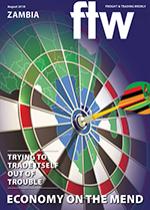CFR Freight has built on earlier successes with consolidation services from Johannesburg to Lusaka and the Copperbelt.
A recovery in commodity prices has resulted in growth in demand for time-sensitive cargo says Hilton Tait, the company’s road freight manager.
“With the extra cash in the economy we have also seen added volumes with an improvement in FMCG volumes, plus trader traffic mostly bound for the informal retail market.
“In addition to the SA domestic exports, CFR Freight has benefited from in bond transit cargo volumes, most of which originate in Asia for final destination in Zambia,” he told FTW. “Initially we tried to offer a premium service with a named-day despatch but market feedback revealed that the main driver was rates although the industry still wanted service. The idea is to increase frequencies − particularly of multinational agents whose corporate clients are looking for reliability and accurate estimates on transit times and delivery.
“A decision taken recently saw the company switch all global freight to the CFR Freight consolidation services. “Prior to this the Durban office handed international freight to co-loaders, but by moving the volumes in-house, we were able to gain critical mass for our own in-house consolidation services,” he says. In addition to consols, CFR Freight has started offering a cross-border cross docking solution.
“The joint capabilities of CFR and ZacPak mean we have an ideal setup for unpacking transit cargo and delivering it as breakbulk. This eliminates costs for over-border container deposits, late turn in and MT (empty) return costs. “We now offer a ‘one stop’ unpack and over-border delivery for LCL and FCL cargo,” he says.
Despite the successes there are challenges and meeting the estimated delivery dates and times requires constant re-evaluation of the routes being used, he says. “At present there is congestion at Kazungula whilst bridge construction is under way, but the switch to Zimbabwe has increased traffic at Beitbridge, and the Zimra (Zimbabwean Revenue Authority) rules and regulations on transit cargo have also slowed down the total transit.
“Everyone has also had issues with border clearances which, according to our Zambian colleagues, have been caused by ongoing Zimra IT issues affecting clearances at all entry points into Zambia.
“In addition to operational issues, pricing has come under the spotlight because of the recent fuel (diesel) increases and the weakening rand and strong US$ leading to increases in Zimbabwean tolls and permits, which all increase trucking overheads” says Tait. “We have been fortunate in that we have seen month-onmonth growth in volumes so we have been able to negotiate rates to counter the proposed increases.
“We have also introduced tighter process and procedures to reduce border delays with the ultimate target being zero tolerance towards border delays,” he says. One of the potentially most disruptive developments being monitored by CFR is the gateway status of Durban for Zambia-bound freight.
“Durban is being evaluated as to whether it is the natural gateway for Zambia and the DRC. There are a number of lines and transporters now promoting alternatives like Walvis Bay, Beira and Dar es Salaam.
“At present this is a threat to full loads, but LCL cargo is still being routed via Durban,” he says.
The idea is to increase frequencies − particularly of multinational agents. – Hilton Tait

